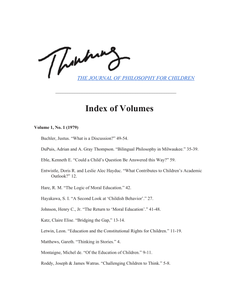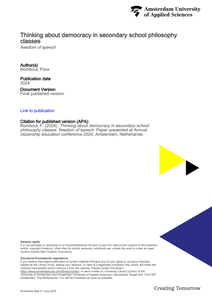The topic of this paper is the constructivism-realism debate, construed as an example of the intrusion of philosophy into science. Against this intrusion I maintain that philosophical problems are not only different from scientific and practical ones. They are also problematic in themselves. That is why their import into our scientific and practical work only creates confusions that hinder us in our work. The aim of the paper is to show that the philosophical problems that create those confusions need a Wittgensteinian therapeutic treatment. The method of the paper consists in comparing what philosophers (or philosophising scientists) say we do with what we actually do. After giving an example of what happens when a rightly respected scientist starts philosophizing, the method is applied, first, to the relation between language and the world and, second, to the relation between theories and the world. In the first application a story about three umpires is used to distinguish language and discourse, between questions of meaning (of the words we use) and questions of truth (of the things we say). In the second application a comparison between maps and theories is used to show the difference between assessing the truth of descriptive statements and explanatory theories. The examples of the umpires and maps are introduced by Weick and in both cases I show that neither constructivist nor metaphysical realist conclusions follow.
DOCUMENT

The journal was a forum for the work of both theorists and practitioners of philosophical practice with children, and published such work in all forms, including philosophical argument and reflection, classroom transcripts, curricula, empirical research, and reports from the field. The journal also maintained a tradition in publishing articles in the hermeneutics of childhood, a field of intersecting disciplines including cultural studies, social history, philosophy, art, literature and psychoanalysis.
DOCUMENT

Smart glasses were perceived to be potentially revolutionary for healthcare, however, there is only limited research on the acceptance and social implications of smart glasses in healthcare. This study aims to get a better insight into the theoretical foundations and the purpose was to identify themes regarding adoption, mediation, and the use of smart glasses from the perspective of healthcare professionals. A qualitative research design with focus groups was used to collect data. Three focus groups with 22 participants were conducted. Data were analyzed using content analysis. Our analysis revealed six overarching themes related to the anticipated adoption of smart glasses: knowledge, innovativeness, use cases, ethical issues, persuasion, and attitude. Nine themes were found related to anticipated mediation and use of smart glasses: attention, emotions, social influences, design, context, camera use, risks, comparisons to known products, and expected reaction and might influence the acceptance of smart glasses.
MULTIFILE

Smart glasses were perceived to be potentially revolutionary for healthcare, however, there is only limited research on the acceptance and social implications of smart glasses in healthcare. This study aims to get a better insight into the theoretical foundations and the purpose was to identify themes regarding adoption, mediation, and the use of smart glasses from the perspective of healthcare professionals. A qualitative research design with focus groups was used to collect data. Three focus groups with 22 participants were conducted. Data were analyzed using content analysis. Our analysis revealed six overarching themes related to the anticipated adoption of smart glasses: knowledge, innovativeness, use cases, ethical issues, persuasion, and attitude. Nine themes were found related to anticipated mediation and use of smart glasses: attention, emotions, social influences, design, context, camera use, risks, comparisons to known products, and expected reaction and might influence the acceptance of smart glasses.
MULTIFILE

“Municipal Youth Work taken over by Christians”. (Binnenlands Bestuur, 2009) This heading refers to the work of Youth for Christ in an Amsterdam neighbourhood. This organisation, successful in Youth Work nationwide, last year came out first in an open competition of the Amsterdam district De Baarsjes. Because of this they were commissioned to undertake all the youth work in this multicultural neighbourhood. The conditions were not to evangelise and not to limit recruitment of personnel inside their own circle but to recruit from outside the organisation as well. When they later appeared to have put a job advertisement only on their own website, this led to heated debates. Finally Youth for Christ acknowledged and rectified this mistake. This example is a concrete illustration of the actual and sometimes delicate relationships between philosophy of life and social work
DOCUMENT

Philosophy is an elective subject in secondary education in the Netherlands, which is not often studied in the context of citizenship education. This is probably because only a minority of students participate in philosophy classes in the upper grades of secondary education (approximately 2-5% of all students). However, especially in the years 2022-2025 philosophy is particularly interesting for those studying how citizenship education can be taught, because the higher general track students study a range of philosophical ideas about democracy for their final exams (Spoelstra et al., 2021).This paper presents a qualitative analysis of three philosophy classes about freedom of speech. The lesson transcripts, pre- and post-observation interviews with 3 teachers and 15 students (5 from each class) are coded thematically with a framework for four teacher responsibilities during philosophical discussion in moral education. These four responsibilities are: teachers have an organizational responsibility to facilitate lesson activities such as classroom dialogue to facilitate thinking about democracy, an epistemic responsibility to warrant valid reasoning and recognition of established facts during the lesson, a pedagogic responsibility to create a safe and open classroom climate and a moral responsibility to find the right balance between value communication and stimulation (Leenders & Veugelers, 2004; Rombout et al., 2022; Sprod, 2001). The main research question was: how do philosophy teachers realize these four responsibilities to facilitate their students’ thinking about democracy in a lesson about freedom of speech and how to teacher and students evaluate these responsibilities in this lesson?The findings contain rich descriptions of lesson activities such as considering borderline cases, facilitating teacher-led dialogue, organizing debate, and learning about philosophers’ arguments. These are supplemented with reflections of the participants on teacher neutrality and how open and safe the classroom climate was during these lessons.
DOCUMENT

Designers have grown increasingly interested in social consequences of new technologies. As social impacts become increasingly important it might be fruitful to understand how social impacts develop and how a designer can anticipate these consequences. In health care practices, for instance, it is important to control unintended social impacts at forehand. Social impact is an outcome of the mediating effect of a technology with its social environment. Human behaviour in a social environment can be analysed from the perspective of a social ecological system. To anticipate social impacts simulations of social practices are needed. To simulate practices the persona approach has been adapted to a screenplay approach in which the elements of a social ecology are used to gain a rich description of a social environment. This has been applied for a 'Heart Managers' case. It was concluded that the screenplay approach can be used for a systematic simulation of future social impacts.
DOCUMENT

In secondary school philosophy classes students learn to reason critically about social and scientific issues. This study examined the effects of a whole-class, teacher-led philosophy classroom dialogue intervention on students’ value-loaded critical thinking. Value-loaded critical thinking is logically consistent, self-reflective reasoning focused on making moral value-judgments about what is right to believe or do. In a quasi-experimental study (N = 437 students) with a pre-test post-test design, we investigated whether engaging in classroom dialogues in which the teachers implemented five design principles for promoting value-loaded critical thinking and transfer thereof, positively affected students’ (n = 150) value-loaded critical thinking in transfer tasks. The results were compared to two comparison conditions: students (n = 149) who participated in regular teacher-led philosophy classroom dialogues and students (n = 145) who followed a regular 10th-grade curriculum without philosophy classes. Results showed that students in the intervention condition outperformed students in both comparison conditions on referring to moral values. Regarding critical reasoning, we only found significant effects compared to the students who followed the regular 10th-grade curriculum. Findings indicate that a specifically designed dialogic intervention can enhance students’ capacities in value-loaded critical thinking.
DOCUMENT

This research concerning the experience and future of zoos was carried out from 2011-2012 and takes regional ideas concerning Zoo Emmen as well as global visions into account. The research focuses partly on Zoo Emmen, its present attractions and visitors while also comparing and contrasting visions on the future in relationship to other international zoos in the world. In this way, remarkable experiences and ideas will be identified and in the light of them, it can serve as inspiration for stakeholders of zoos at large. The main research subject is a look at the future zoos in view of: The Zoo Experience – an international experience benchmark; The Zoo of the Future – a Scenario Planning approach towards the future; The virtual zoo - zoo’s in the internet domain.
DOCUMENT

The idea that technologies influence society—both positively and negatively—is not new. This is mainly the terrain of the philosophy and the ethics of technolo-gy research. Similarly, design research aims to help create new technologies in line with individual, social, and societal needs and values. Against this backdrop, it seems essential to expose relations between design and philosophy of tech-nology research, particularly from a methodological perspective. The main goal of this paper is to suggest a preliminary overview of methods and approaches that can inspire and inform interdisciplinary collaboration and, with that, sys-tematic engagement with ethics in design processes. Through interdisciplinary exchange, we propose a preliminary typology of ethics-informed methods and approaches based on two main dimensions, namely theory-grounded approaches to theoretically-flexible techniques and assessment to accompaniment. This mapping intends to help navigate the ethical qualities of selected methods from both disciplines, and it aims to create a platform for fruitful interdisciplinary conversations.
MULTIFILE
